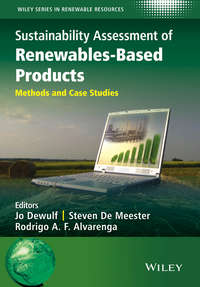Jo Dewulf - Sustainability Assessment of Renewables-Based Products. Methods and Case Studies

Over the past decade, renewables-based technology and sustainability assessment methods have grown tremendously. Renewable energy and products have a significant role in the market today, and the same time sustainability assessment methods have advanced, with a growing standardization of environmental sustainability metrics and consideration of social issues as part of the assessment. Sustainability Assessment of Renewables-Based Products: Methods and Case Studies is an extensive update and sequel to the 2006 title Renewables-Based Technology: Sustainability Assessment. It discusses the impressive evolution and role renewables have taken in our modern society, highlighting the importance of sustainability principles in the design phase of renewable-based technologies, and presenting a wide range of sustainability assessment methods suitable for renewables-based technologies, together with case studies to demonstrate their applications. This book is a valuable resource for academics, businesses and policy makers who are active in contributing to more sustainable production and consumption. For more information on the Wiley Series in Renewable Resources, visit www.wiley.com/go/rrs Topics covered include: The growing role of renewables in our society Sustainability in the design phase of products and processes Principles of sustainability assessment Land use analysis Water use analysis Material and energy flow analysis Exergy and cumulative exergy analysisCarbon and environmental footprint methods Life Cycle Assessment (LCA), social Life Cycle Assessment and Life Cycle Costing (LCC) Case studies: renewable energy, bio-based chemicals and bio-based materials.









